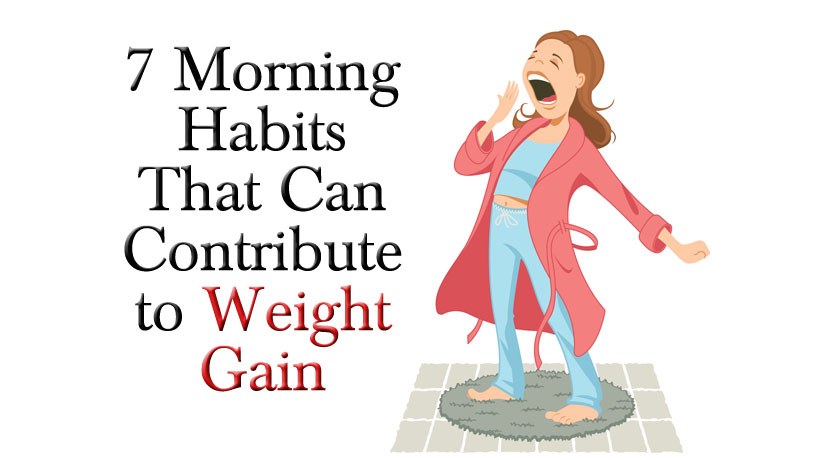Our morning habits are key in preparing our bodies for the day’s events, and many of them can harm us. Mindfulness, appetite, our bodies’ ways of adjusting to the morning, and more are affected by how we act. Here are seven morning habits that can cause weight gain.
Getting dressed in the dark
If you get dressed with the blinds closed, you might be setting yourself up to gain more weight. Sunlight has vitamin D, which helps regulate your body’s calcium and phosphate levels. This vitamin also helps you lose weight by suppressing your appetite. According to a study published in the Journal of Clinical Endocrinology and Metabolism, “Young women with vitamin D insufficiency were significantly heavier and had greater body mass than women with normal levels.”
Skipping breakfast
If you like to skip breakfast in the morning to avoid calories or because you’re in a time crunch, think again. By not having breakfast, your body doesn’t get a needed energy boost, and you can gain weight. According to a review published in the Journal of Rural Medicine, “Skipping breakfast causes a shift in the phase of expression of the clock gene, resulting in a nocturnal lifestyle pattern, which may be associated with obesity.”
Not drinking water
Your body needs water every day, and not drinking water in the morning can affect your daily life, energy, and appetite, causing you to gain more weight. According to a review published in the journal Nutrition Reviews, “By following women on a range of diet plans that shifted water intake, the studies found significant differences in energy, weight and % body fat among the higher water drinkers.”
Oversleeping
Sleep restores and rests your body, helping you tackle the next day in style. However, giving yourself five or 10 minutes more of sleep than what you usually get can cause weight gain. According to a study published in the journal Sleep, “Long-duration sleepers had higher BMIs at baseline, making it plausible that they would be more likely to gain weight.” Oversleeping messes with your biorhythm and energy, causing you to eat more and gain weight.
Not meditating
Meditation is a wonderful way to give yourself peace and mindfulness before a hectic day. It reduces cortisol production and stress, both of which cause you to gain weight. According to WebMD, “Meditation does help you become more aware of your thoughts and actions, including those that relate to food.” By not meditating, you’re not getting these mental benefits which can help you lose weight.
Not weighing yourself
Weighing yourself in the morning can make you cringe and avoid it altogether, especially if you’re trying to lose weight. However, by not monitoring yourself, you won’t realize you’re gaining weight until it hits you weeks later. According to a study published in the Journal of the Academy of Nutrition and Dietetics, “More frequent self-monitoring was consistently and significantly associated with weight loss compared to less frequent self-monitoring.”
The American Heart Association warns that while there may be benefits of daily weigh-ins to track your progress, if it is more distressing than motivating, then it may not be right for you.
Not tracking food intake
Keeping a chart of what you eat from morning until night is a great way to keep an eye on consumption. Sometimes you won’t be aware of how much you eat a day until you track it on paper. No matter if you’re on a diet or if you like to be on top of your meals, it doesn’t hurt to keep a log of food intake every day.
Sources:
Richard Kremer, Patricia P. Campbell, Timothy Reinhardt, Vicente Gilsanz; Vitamin D Status and Its Relationship to Body Fat, Final Height, and Peak Bone Mass in Young Women, The Journal of Clinical Endocrinology & Metabolism, Volume 94, Issue 1, 1 January 2009, Pages 67–73, https://doi.org/10.1210/jc.2008-1575
Watanabe, Y., Saito, I., Henmi, I., Yoshimura, K., Maruyama, K., Yamauchi, K., Matsuo, T., Kato, T., Tanigawa, T., Kishida, T., … Asada, Y. (2014). Skipping Breakfast is Correlated with Obesity. Journal of rural medicine: JRM, 9(2), 51-8.
Daniels, M. C., & Popkin, B. M. (2010). Impact of water intake on energy intake and weight status: a systematic review. Nutrition reviews, 68(9), 505-21.
Chaput, J. P., Després, J. P., Bouchard, C., & Tremblay, A. (2008). The association between sleep duration and weight gain in adults: a 6-year prospective study from the Quebec Family Study. Sleep, 31(4), 517-23.
https://www.webmd.com/balance/features/meditation-hypertension-and-weight-loss#1
Burke, L. E., Wang, J., & Sevick, M. A. (2011). Self-monitoring in weight loss: a systematic review of the literature. Journal of the American Dietetic Association, 111(1), 92-102.
https://www.heart.org/en/news/2019/01/02/the-pros-and-cons-of-weighing-yourself-every-day



